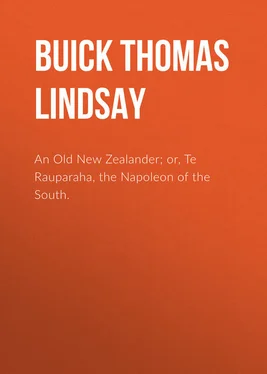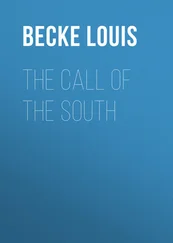Thomas Buick - An Old New Zealander; or, Te Rauparaha, the Napoleon of the South.
Здесь есть возможность читать онлайн «Thomas Buick - An Old New Zealander; or, Te Rauparaha, the Napoleon of the South.» — ознакомительный отрывок электронной книги совершенно бесплатно, а после прочтения отрывка купить полную версию. В некоторых случаях можно слушать аудио, скачать через торрент в формате fb2 и присутствует краткое содержание. Жанр: foreign_antique, foreign_prose, на английском языке. Описание произведения, (предисловие) а так же отзывы посетителей доступны на портале библиотеки ЛибКат.
- Название:An Old New Zealander; or, Te Rauparaha, the Napoleon of the South.
- Автор:
- Жанр:
- Год:неизвестен
- ISBN:нет данных
- Рейтинг книги:3 / 5. Голосов: 1
-
Избранное:Добавить в избранное
- Отзывы:
-
Ваша оценка:
- 60
- 1
- 2
- 3
- 4
- 5
An Old New Zealander; or, Te Rauparaha, the Napoleon of the South.: краткое содержание, описание и аннотация
Предлагаем к чтению аннотацию, описание, краткое содержание или предисловие (зависит от того, что написал сам автор книги «An Old New Zealander; or, Te Rauparaha, the Napoleon of the South.»). Если вы не нашли необходимую информацию о книге — напишите в комментариях, мы постараемся отыскать её.
An Old New Zealander; or, Te Rauparaha, the Napoleon of the South. — читать онлайн ознакомительный отрывок
Ниже представлен текст книги, разбитый по страницам. Система сохранения места последней прочитанной страницы, позволяет с удобством читать онлайн бесплатно книгу «An Old New Zealander; or, Te Rauparaha, the Napoleon of the South.», без необходимости каждый раз заново искать на чём Вы остановились. Поставьте закладку, и сможете в любой момент перейти на страницу, на которой закончили чтение.
Интервал:
Закладка:
These were, no doubt, excellent words of advice, and they expressed a very noble sentiment; but the practical question which they had to determine was whether they could afford to adopt an attitude of passivity while these acts of aggression went on around them: whether they should declare war on account of the destruction of their canoe, or permit the act to pass without notice. This was the problem over which they pondered; and, as they discussed and debated it, "impatient feelings kept ever rising up in their hearts." But at last an end was made of deliberation, the decision of the tribe being in favour of battle as the one and only sufficient means by which they could be compensated for the burning of their canoe. In the words of the old tradition, "then commenced the great war which was waged between those who arrived in the Arawa and those who came in the Tainui." 21 21 "It is to be presumed that Raumati's relatives and friends at Tauranga made his cause their own, for they met the Arawa people somewhere near Maketu, where a great battle was fought. Raumati's party, though successful at first, were defeated, and their leader killed by the power of makutu , or witch-craft, for Hatu-patu, the Arawa chief, caused a cliff to fall on him as he retreated from the battle, and thus killed him" ( Polynesian Journal ).
CHAPTER III
A WARRIOR IN THE MAKING
In one of the many sanguinary battles of those intertribal wars which raged in Old New Zealand from this period down to the introduction of Christianity, Werawera, the father of Te Rauparaha, was captured, killed, and eaten. The subject of our sketch was at that time a mere child, and the grim old warrior who had made a meal of Werawera was heard to remark that, if ever the youngster fell into his hands, he would certainly meet a similar fate, as he would make a delicious relish for so great a warrior's rau-paraha . The rau-paraha here referred to was a juicy plant of the convolvulus family, which grew luxuriantly upon the sand-dunes of the seashore, and was largely used by the Maori of those days as an article of food. Such a tragic association of the child with the plant was never forgotten by his tribe, and it was from this circumstance that he derived that name which has stood paramount amongst Maori toas 22 22 Braves.
of all time – Te Rauparaha – the convolvulus leaf. The branch of the Tainui people to which Te Rauparaha belonged was the Ngati-Toa tribe, who have already been described as occupying the country immediately surrounding the shores of Kawhia harbour. Like all the other Tainui tribes, these people claimed direct descent from Hoturoa, the admiral of the canoe; but the ancestor from whom they derived their name was Toa-rangatira, and from him Te Rauparaha was descended in a direct line on his father's side. Werawera, however, had married a Ngati-Raukawa lady, named Pare-kowhatu, and this fact, placing a bar sinister across Te Rauparaha's escutcheon, destroyed in a measure the purity of his pedigree from the Ngati-Toa point of view, although, as compensation, it gave him an influence with the Ngati-Raukawa tribe, which in after years carried with it fateful results.
The Ngati-Raukawa people were closely allied to Ngati-Toa by ties of blood and friendship; for Raukawa, the ancestor who gave them name and individuality as a tribe, was related to Toa-rangatira, both chiefs being descendants of Raka, and through him of Hoturoa. This common ancestry gave these two tribes a common interest and sympathy, which were steadily increased by frequent inter-marriages; and to these bonds they appear to have been faithful through all the varying fortunes of their history. Conflicts between the Ngati-Toa and Ngati-Raukawa tribes were less frequent than was the case with the majority of the tribal families; and when the time came to mould their affinities into a closer union, Te Rauparaha used this long-standing friendship as the central argument, by which he eloquently sought to convince Ngati-Raukawa that there was but one destiny for them and for Ngati-Toa.
Te Rauparaha had two brothers and two sisters, all older than himself; but none of them ever achieved a great position or reputation in the tribe, except perhaps Waitohi 23 23 Waitohi had other children, one of whom, Topeora, afterwards became the mother of Matene Te Whiwhi, one of the most influential and friendly chiefs on the west coast of the North Island. Topeora is perhaps more famed than any other Maori lady, for the number of her poetical effusions, which generally take the form of kaioraora , or cursing songs, in which she expresses the utmost hatred of her enemies. Her songs are full of historical allusions, and are therefore greatly valued. She also bore the reputation of being something of a beauty in her day.
, who might claim the reflected glory of being the mother of that fiery and volcanic soul, Te Rangihaeata. This chief, whose life enters largely into early New Zealand history, rose to be the fighting lieutenant and trusted adviser of his more famous uncle, and, in these questionable capacities, he was probably the most turbulent spirit who crossed the path of Wellington's pioneer colonists. Towards them he ever manifested an uncompromising hatred, the one redeeming feature of his hostility being the absolute frankness with which he proclaimed it.
Unfortunately but little is known of Te Rauparaha's boyhood. Presumably he was brought up by his mother, after his father's death, between the settlements at Maungatautari 24 24 There appears to be some doubt as to the exact locality of Te Rauparaha's birth, some authorities giving it as Maungatautari and others as Kawhia.
, where he was born about the year 1768, and Kawhia, where his father's relatives lived. As he grew in years, the greater part of his time was spent at Kawhia with the Ngati-Toa tribe, by whom he was regarded as a hereditary chief and as one of their future leaders. His influence with Ngati-Raukawa did not commence until he had attained to early manhood; and the visits which he paid to his kindred at Maungatautari during this period had no military importance, and could only be regarded as interchanges of friendship. His sojourns at Maungatautari were always welcome, for as a boy he is said to have had a particularly sunny disposition, and to have entered eagerly into all the amusements dear to the heart of Maori children of that day. These enterprises frequently led him into mischief, and into those moral pitfalls which beset the path of high-spirited lads. But, for all his boisterous spirits, the boy never failed to pay respect to his elders, and one of the marked characteristics of his nature at this time was his willing obedience to those who were entitled to give him commands. He was even known to have performed services at the request of a slave, whom he might very well have ordered to do his own work, since his birth and breeding placed him far above the behests of a menial.
As Te Rauparaha grew to youth and early manhood he began to display qualities of mind which soon attracted the attention of the leading Ngati-Toa chiefs; but, strange to say, his mother was the last to discern these exceptional talents in her son, and always maintained that Nohorua, his elder brother, was the clever boy of the family. These maternal expectations, however, were not destined to be realised.
Before the introduction of Christianity amongst the Maori, it was the custom to assign to a young chief some girl from his own or a neighbouring friendly tribe as his wife. Neither of the parties most directly interested in the alliance was consulted, and their feelings or wishes were not considered to have any important bearing upon the question. Such a system frequently led to unhappiness and heart-burning, but in the case of Te Rauparaha, the choice made for him proved to be a happy one, and Marore 25 25 Marore was killed by a member of the Waikato tribe – it is said, at the instigation of Te Wherowhero – while she was attending a tangi in their district, about the year 1820.
, a girl of tender grace, made him an admirable wife. Of her he became extremely fond, and out of this affection arose the first military enterprise which gave him fame and reputation as a leader of men.
Интервал:
Закладка:
Похожие книги на «An Old New Zealander; or, Te Rauparaha, the Napoleon of the South.»
Представляем Вашему вниманию похожие книги на «An Old New Zealander; or, Te Rauparaha, the Napoleon of the South.» списком для выбора. Мы отобрали схожую по названию и смыслу литературу в надежде предоставить читателям больше вариантов отыскать новые, интересные, ещё непрочитанные произведения.
Обсуждение, отзывы о книге «An Old New Zealander; or, Te Rauparaha, the Napoleon of the South.» и просто собственные мнения читателей. Оставьте ваши комментарии, напишите, что Вы думаете о произведении, его смысле или главных героях. Укажите что конкретно понравилось, а что нет, и почему Вы так считаете.











